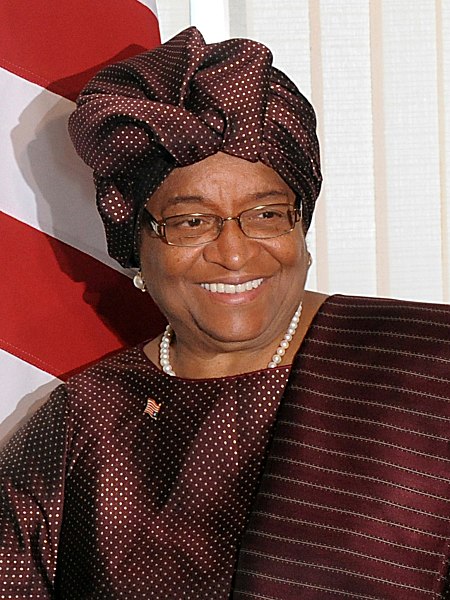The Unstoppable Legacy of Ellen Johnson Sirleaf: Lessons in Leadership and Empowerment

A Visionary Leader: Ellen Johnson Sirleaf’s Impact on Liberia and Beyond
Ellen Johnson Sirleaf is a name that has become synonymous with leadership, not just in Liberia but globally. She is a woman of many firsts – the first democratically elected female president in Africa, the first African woman to receive the Nobel Peace Prize, and the first female head of state in Liberia. She is a trailblazer and an inspiration to many.
Born in Monrovia, Liberia in 1938, Ellen Johnson Sirleaf’s life and career have been marked by courage, resilience, and determination. She has overcome countless obstacles and challenges to become one of the most influential leaders in Africa’s history. Her leadership style and lessons have been studied and emulated by many, making her an important figure in the world of leadership development.
The importance of studying Ellen Johnson Sirleaf’s leadership style and lessons cannot be overstated. As a leader, she has demonstrated exceptional qualities that have enabled her to lead Liberia through some of its most challenging times. Her leadership style is characterized by her commitment to transparency, accountability, and good governance. She has been an advocate for human rights, gender equality, and economic growth.
In this article, we will explore the life and leadership of Ellen Johnson Sirleaf, highlighting the lessons that can be learned from her experiences. We will delve into her early life and career, her rise to power, her economic and political reforms, her efforts to empower women, her challenges and controversies, and her legacy and impact.
Through her life and leadership, Ellen Johnson Sirleaf has shown that anything is possible with determination, hard work, and the right leadership skills. Her story is one that inspires and motivates, and her lessons are ones that every aspiring leader should take to heart.
Early Life and Career
Ellen Johnson Sirleaf was born in Monrovia, Liberia, on October 29, 1938. She was the daughter of Jahmale Carney Johnson, a Liberian politician, and Luisa Howard, a schoolteacher. Her parents divorced when she was young, and she was raised by her grandmother, who instilled in her a love of education and a strong work ethic.
Sirleaf attended the College of West Africa in Monrovia, and later, the Madison Business College. She then traveled to the United States, where she attended Harvard University’s John F. Kennedy School of Government, earning a Master’s degree in Public Administration.
After completing her studies in the US, Sirleaf returned to Liberia, where she worked for the government in various capacities. She served as Assistant Minister of Finance, Minister of Finance, and Minister of State for Finance and Economic Planning. In 1980, she became the first female Minister of Finance in Liberia’s history, under the administration of President William Tolbert.
However, her career was abruptly interrupted in 1980, when a military coup led by Samuel Doe overthrew the government, and Sirleaf was imprisoned for criticizing the new regime. She was later released and exiled to Kenya, where she worked for the World Bank.
Despite the challenges she faced, Sirleaf remained committed to her country and continued to work for its development from abroad. She served as a consultant for various international organizations, including the United Nations Development Programme and the African Development Bank.
In 1997, she returned to Liberia to run for president, but was defeated by Charles Taylor. She left the country once again, but continued to advocate for democracy and good governance in Liberia. Finally, in 2005, after years of struggle and perseverance, Sirleaf was elected as Liberia’s president, becoming the first democratically elected female president in Africa.
Ellen Johnson Sirleaf’s early life and career are a testament to her determination and resilience. Despite facing numerous obstacles and setbacks, she never gave up on her dreams and continued to work tirelessly for the betterment of her country. Her experiences demonstrate the importance of perseverance and commitment in leadership, and how these qualities can inspire others to work towards a common goal.
Rise to Power
Ellen Johnson Sirleaf’s rise to power was marked by determination, perseverance, and a commitment to democratic values. After years of working in various capacities for the Liberian government and international organizations, Sirleaf returned to Liberia in 1997 to run for president. Her candidacy was met with resistance and skepticism, as she was seen as an outsider by many in Liberia’s political establishment.
Despite the challenges she faced, Sirleaf remained steadfast in her conviction that she could bring change to Liberia. She focused her campaign on issues of good governance, transparency, and economic growth. Her platform resonated with many Liberians who were tired of the corruption and instability that had plagued their country for decades.
Unfortunately, Sirleaf’s first bid for the presidency was unsuccessful. She was defeated by Charles Taylor, a former warlord who was known for his brutal tactics and human rights abuses. Taylor’s victory was widely seen as illegitimate, and many Liberians were left feeling disillusioned and frustrated.
However, Sirleaf refused to give up on her vision for Liberia. She continued to speak out against the Taylor regime and to advocate for democratic values and human rights. She traveled the world, building alliances and raising awareness about the plight of the Liberian people.
Finally, in 2005, after years of struggle and perseverance, Sirleaf was elected as Liberia’s president. Her victory was historic – she became the first democratically elected female president in Africa. Her election was a testament to her leadership skills, her commitment to democracy, and her ability to inspire others to work towards a common goal.
As president, Sirleaf focused her efforts on rebuilding Liberia’s economy, strengthening its institutions, and promoting human rights and gender equality. She implemented a number of reforms, including the creation of a Truth and Reconciliation Commission to address the human rights abuses that had occurred during Liberia’s civil war, and the establishment of a National Anti-Corruption Commission to root out corruption in government.
Sirleaf’s leadership style was characterized by her commitment to transparency, accountability, and good governance. She was known for her willingness to listen to the concerns of ordinary Liberians, and for her ability to bring together different factions and interest groups in pursuit of a common goal. Her leadership during the Ebola crisis, which struck Liberia in 2014, was widely praised for its effectiveness and compassion.
Ellen Johnson Sirleaf’s rise to power is a story of perseverance, determination, and commitment to democratic values. Her journey from political outsider to Africa’s first democratically elected female president is a testament to the power of leadership and the importance of never giving up on one’s dreams. Her leadership style and lessons serve as an inspiration to leaders everywhere, showing that anything is possible with hard work, dedication, and a strong sense of purpose.
Leadership Lessons
Ellen Johnson Sirleaf’s leadership style is characterized by a number of key traits and principles that have enabled her to lead Liberia through some of its most challenging times. As a leader, Sirleaf is known for her commitment to transparency, accountability, and good governance. She has been an advocate for human rights, gender equality, and economic growth. Her leadership style offers a number of important lessons for aspiring leaders.
Perseverance and Determination
One of the most important lessons that can be learned from Ellen Johnson Sirleaf’s leadership style is the importance of perseverance and determination. Sirleaf faced numerous obstacles and setbacks throughout her career, including imprisonment, exile, and electoral defeat. However, she never gave up on her vision for Liberia and remained committed to her goals. Her determination and resilience are a testament to the power of perseverance in leadership.
Integrity and Transparency
Another key trait of Sirleaf’s leadership style is her commitment to integrity and transparency. She has always been open and honest with the Liberian people, and has worked to promote transparency and accountability in government. Her efforts to root out corruption and establish institutions that promote good governance are a testament to the importance of integrity and transparency in leadership.
Listening and Empathy
Sirleaf’s leadership style is also characterized by her willingness to listen to the concerns of ordinary Liberians and to empathize with their struggles. She has made it a priority to engage with citizens at all levels of society, and to take their concerns into account when making decisions. This approach has helped to build trust and support for her leadership, and demonstrates the importance of listening and empathy in leadership.
Gender Equality and Women’s Empowerment
As Africa’s first female president, Sirleaf has been a champion of gender equality and women’s empowerment. She has implemented policies and initiatives aimed at improving the status of women in Liberia, including increasing access to education and healthcare, and promoting women’s participation in politics and business. Her leadership in this area demonstrates the importance of gender equality and women’s empowerment in building strong and sustainable societies.
Boldness and Vision
Finally, Sirleaf’s leadership style is characterized by her boldness and vision. She has been willing to take risks and pursue ambitious goals, even in the face of significant challenges. Her vision for Liberia’s future, grounded in the principles of democracy, human rights, and economic growth, has inspired others to work towards a common goal. Her leadership demonstrates the importance of boldness and vision in driving meaningful change.
Ellen Johnson Sirleaf’s leadership style offers a number of important lessons for aspiring leaders. Her commitment to perseverance, integrity, transparency, listening, empathy, gender equality, and boldness and vision, serve as a model for effective leadership. Her experiences demonstrate that with the right skills, determination, and a sense of purpose, anything is possible.
Economic and Political Reforms
Ellen Johnson Sirleaf’s leadership in Liberia was marked by a number of significant economic and political reforms. As president, she faced the daunting task of rebuilding a country that had been devastated by decades of civil war, corruption, and instability. Through her leadership, Sirleaf implemented a number of reforms aimed at promoting economic growth, improving governance, and addressing the needs of ordinary Liberians.
Economic Reforms
One of Sirleaf’s most significant accomplishments as president was her work to promote economic growth and stability in Liberia. She implemented a number of reforms aimed at attracting foreign investment, reducing debt, and increasing access to credit for small businesses. Her efforts helped to create jobs and improve living standards for many Liberians.
Sirleaf also established the Liberia Revenue Authority, which was tasked with collecting taxes and ensuring that government revenues were used effectively. This initiative helped to address the problem of corruption in government and to promote greater transparency and accountability.
Anti-Corruption Measures
Another key area of reform under Sirleaf’s leadership was the fight against corruption. She established the National Anti-Corruption Commission, which was tasked with investigating and prosecuting corruption cases. This initiative helped to create a culture of accountability in government and to send a message that corruption would not be tolerated.
Political Reforms
Sirleaf’s leadership was also marked by a number of political reforms aimed at strengthening democratic institutions and promoting human rights. She established the Truth and Reconciliation Commission, which was tasked with investigating human rights abuses that had occurred during Liberia’s civil war. The commission helped to promote reconciliation and to address some of the grievances that had fueled the conflict.
Sirleaf also worked to promote greater political participation, particularly for women and marginalized groups. She established the Ministry of Gender and Development, which was tasked with promoting gender equality and addressing the needs of women in Liberia. She also worked to increase women’s representation in government, both through appointments and through efforts to promote their participation in elections.
Education and Healthcare
Under Sirleaf’s leadership, Liberia also made significant progress in the areas of education and healthcare. She implemented a number of reforms aimed at improving access to education and healthcare for all Liberians, particularly for women and children. Her efforts helped to increase enrollment rates and improve health outcomes for many Liberians.
Sirleaf’s leadership in economic and political reforms demonstrates the importance of good governance, transparency, and accountability in building strong and sustainable societies. Her efforts to promote economic growth, reduce corruption, and strengthen democratic institutions have helped to lay the foundation for a brighter future for Liberia. Her leadership serves as a model for other leaders in Africa and around the world, demonstrating that with the right policies and the right leadership skills, anything is possible.
Women’s Empowerment
As Africa’s first female president, Ellen Johnson Sirleaf was a champion of gender equality and women’s empowerment. She believed that empowering women was essential to building strong and sustainable societies, and her leadership in this area had a profound impact on Liberia and beyond.
Policies and Initiatives
As president, Sirleaf implemented a number of policies and initiatives aimed at improving the status of women in Liberia. She established the Ministry of Gender and Development, which was tasked with promoting gender equality and addressing the needs of women in Liberia. She also worked to increase women’s representation in government, both through appointments and through efforts to promote their participation in elections.
Sirleaf’s efforts to improve access to education and healthcare for women were also significant. She implemented a number of reforms aimed at improving maternal and child health outcomes, reducing gender-based violence, and increasing access to family planning services. Her efforts helped to increase enrollment rates for girls and to improve health outcomes for women and children in Liberia.
Economic Empowerment
In addition to her work in education and healthcare, Sirleaf was also committed to promoting women’s economic empowerment. She believed that empowering women to participate in the formal economy was essential to reducing poverty and promoting sustainable development.
Under Sirleaf’s leadership, Liberia implemented a number of programs aimed at increasing women’s access to credit and training opportunities. She established the Liberia Women’s Entrepreneurship Program, which provided training and support for women entrepreneurs. She also worked to increase women’s access to land and other productive resources, which helped to increase their economic opportunities.
International Advocacy
In addition to her work in Liberia, Sirleaf was also a powerful advocate for women’s empowerment on the international stage. She used her platform as president to speak out on issues of gender equality and to advocate for greater investment in programs aimed at improving the status of women and girls.
Sirleaf’s leadership in women’s empowerment serves as an inspiration to women and girls around the world. Her commitment to gender equality and her efforts to promote women’s participation in all areas of society demonstrate the importance of inclusive leadership and the power of women’s voices in driving meaningful change.
Ellen Johnson Sirleaf’s leadership in women’s empowerment had a profound impact on Liberia and beyond. Her policies and initiatives aimed at improving the status of women in Liberia helped to increase access to education and healthcare, promote economic empowerment, and reduce gender-based violence. Her advocacy on the international stage helped to raise awareness about the importance of gender equality and to promote greater investment in programs aimed at improving the lives of women and girls. Sirleaf’s leadership in women’s empowerment serves as a model for other leaders around the world, demonstrating the importance of inclusive leadership and the power of women’s voices in driving meaningful change.
Challenges and Controversies
Despite her many accomplishments as Liberia’s president, Ellen Johnson Sirleaf’s leadership was not without its challenges and controversies. Throughout her tenure as president, Sirleaf faced criticism and opposition from a variety of sources. However, her leadership in addressing these challenges offers valuable lessons for leaders facing controversy.
Criticisms of Sirleaf’s Leadership
One of the most significant criticisms of Sirleaf’s leadership was related to her handling of the Ebola crisis in 2014. Many Liberians felt that the government’s response was slow and ineffective, and that more could have been done to prevent the spread of the virus.
Sirleaf was also criticized for her handling of the economy, with some arguing that her economic policies favored foreign investors at the expense of ordinary Liberians. Additionally, she faced criticism for her perceived lack of progress in addressing corruption and improving governance in Liberia.
Addressing the Challenges
Despite these challenges, Sirleaf remained committed to her vision for Liberia and to her principles of good governance, transparency, and accountability. In response to criticisms of her handling of the Ebola crisis, Sirleaf established the Incident Management System, which was tasked with coordinating the government’s response to the outbreak. This initiative helped to improve coordination and communication among government agencies, and contributed to a more effective response to the crisis.
To address concerns about the economy, Sirleaf implemented a number of policies aimed at promoting economic growth and reducing poverty. She worked to attract foreign investment and to promote entrepreneurship and small business development. She also implemented programs aimed at improving access to education and healthcare, and at promoting gender equality and women’s empowerment.
Sirleaf also remained committed to addressing corruption and improving governance in Liberia. She established the National Anti-Corruption Commission, which was tasked with investigating and prosecuting corruption cases. She also implemented a number of reforms aimed at improving transparency and accountability in government, including the establishment of the Liberia Revenue Authority.
Lessons Learned
Sirleaf’s leadership in addressing these challenges offers valuable lessons for leaders facing controversy. First and foremost, she remained committed to her principles of good governance, transparency, and accountability. She was willing to listen to criticisms and to take action to address them, while remaining true to her vision for Liberia.
Secondly, Sirleaf’s willingness to seek out expert advice and to work collaboratively with others was key to her success in addressing these challenges. She recognized the importance of bringing together a range of stakeholders and experts to develop effective solutions to complex problems.
Finally, Sirleaf’s leadership in handling controversies demonstrates the importance of transparency and communication in building trust and confidence among stakeholders. By being open and honest about the challenges facing Liberia, and by communicating her plans and progress to the public, Sirleaf was able to build support for her leadership and her vision for the country.
Ellen Johnson Sirleaf’s leadership in addressing challenges and controversies in Liberia offers valuable lessons for leaders everywhere. Her commitment to good governance, transparency, and accountability, her willingness to seek out expert advice and collaborate with others, and her focus on transparency and communication, offer a blueprint for effective leadership in the face of controversy. By applying these lessons, leaders can build trust and confidence among stakeholders, and drive meaningful change towards a brighter future.
Legacy and Impact
Ellen Johnson Sirleaf’s legacy as Liberia’s president and Africa’s first democratically elected female president is one of perseverance, determination, and leadership. Her impact on Liberia and Africa as a whole has been significant, and her leadership offers important lessons for aspiring leaders looking to leave a positive legacy.
Sirleaf’s Impact on Liberia and Africa
Sirleaf’s leadership in rebuilding Liberia’s economy, promoting good governance and transparency, and advancing women’s rights has had a significant impact on the country and the region. Under her leadership, Liberia made significant progress in reducing poverty, improving access to education and healthcare, and promoting economic growth and stability.
Sirleaf’s leadership also had a broader impact on Africa as a whole. Her election as Africa’s first democratically elected female president was a milestone in the fight for gender equality and women’s empowerment on the continent. Her leadership served as an inspiration to women and girls throughout Africa and around the world, demonstrating that women can be effective leaders and agents of change.
Lessons Learned about Leaving a Positive Legacy
Ellen Johnson Sirleaf’s leadership offers important lessons for leaders looking to leave a positive legacy. First, she demonstrated the importance of perseverance and determination in achieving one’s goals. Despite facing numerous obstacles and setbacks, she remained committed to her vision for Liberia and never gave up on her goals.
Secondly, Sirleaf’s leadership in promoting good governance, transparency, and accountability demonstrated the importance of ethical leadership in leaving a positive legacy. By prioritizing transparency and accountability in government, she helped to create a culture of trust and confidence among the Liberian people and to lay the foundation for sustainable development.
Thirdly, Sirleaf’s leadership in promoting women’s empowerment demonstrated the importance of inclusive leadership in leaving a positive legacy. By promoting gender equality and women’s participation in all areas of society, she helped to create a more just and equitable society in Liberia and to inspire women and girls throughout Africa and around the world.
Ellen Johnson Sirleaf’s legacy as Liberia’s president and Africa’s first democratically elected female president is one of perseverance, determination, and leadership. Her impact on Liberia and Africa as a whole has been significant, and her leadership offers important lessons for aspiring leaders looking to leave a positive legacy. By prioritizing ethical leadership, promoting transparency and accountability, and embracing inclusive leadership, leaders can drive meaningful change and leave a positive legacy that will endure for generations to come.
Sirleaf’s Legacy: A Blueprint for Ethical Leadership and Inclusive Development
In conclusion, Ellen Johnson Sirleaf’s leadership in Liberia and Africa as a whole offers a powerful example of what is possible when visionary leadership, perseverance, and commitment to good governance and transparency come together. As Africa’s first democratically elected female president, Sirleaf faced daunting challenges in leading a country that had been ravaged by civil war and political instability for decades.
However, through her leadership, Liberia made significant progress in rebuilding its economy, promoting good governance and transparency, and advancing women’s rights. Sirleaf’s leadership serves as a model for leaders everywhere, demonstrating the importance of ethical leadership, perseverance, and commitment to inclusive and sustainable development.
Sirleaf’s leadership offers important lessons for aspiring leaders. She demonstrated the importance of perseverance and determination in achieving one’s goals, as well as the importance of ethical leadership in promoting transparency and accountability in government. Her commitment to promoting gender equality and women’s empowerment serves as a powerful reminder of the importance of inclusive leadership in building strong and sustainable societies.
Looking to the future, Sirleaf’s legacy as a leader offers a roadmap for aspiring leaders. By prioritizing ethical leadership, promoting transparency and accountability, and embracing inclusive leadership, leaders can drive meaningful change and leave a positive legacy that will endure for generations to come.
In short, Ellen Johnson Sirleaf’s leadership in Liberia and Africa as a whole will continue to inspire and inform leaders for years to come. Her vision for a more just and equitable world, grounded in the principles of democracy, human rights, and economic growth, serves as a beacon of hope for all those committed to building a better future for our world.






